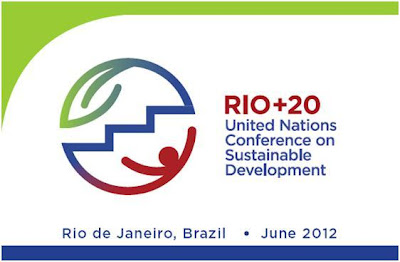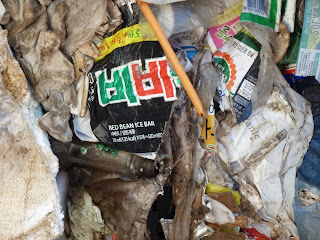Philippine NGOs Join Clamor for World Leaders to Commit to a Toxics-Free Future

As government negotiators race for a crucial agreement that many hope will set the path for a sustainable planet, over 150 groups from the Philippines asked world leaders not to neglect the harm caused by toxic chemicals and wastes and the need for resolute action to protect the public health and the environment.
In an effort to elevate the chemical safety agenda at the Rio+20 UN Conference on Sustainable Development on June 20-22 in Brazil, the groups signed the “Common Statement for a Toxics-Free Future” initiated by IPEN and its international civil society partners and supported by some 1,000 organizations from over 90 countries.
The groups affirmed and asked government leaders to uphold that “living in a pollution-free world is a basic human right.”
“We join the global campaign for a toxics-free future where exposure to toxic and hazardous chemicals is no longer a source of harm and where people have the right to enjoy healthy and sustainable green livelihoods that do not harm their bodies or the environment,” the groups declared.
Among the groups that have signed the statement were the EcoWaste Coalition, Alliance of Progressive Labor, AlyansaTigil Mina, Asian Peasant Coalition, Buklurang Manggagawa ng Pilipinas-NCR, Cavite Green Coalition, Framework Convention on Tobacco Control Alliance-Philippines, Green Convergence for Safe Food, Healthy Food and Sustainable Economy, Jubilee South Asia/Pacific Movement on Debt and Development, NGO Forum on ADB, No to Coal Coalition, Save Babies Coalition and the Save Sierra Madre Network.
Through the statement, the groups challenged world leaders to take steps to create a safe, sustainable approach to chemicals that includes:
a.Global phase-out of toxic chemicals that harm human health and the environment;
b. Protection, right to know, fair compensation, medical treatment and environmental justice for workers and families impacted by chemical pollution;
c. Cost structures for chemicals that reflect their true cost to people and the environment and which will help eliminate pollution; and
d. Investments to create a sustainable chemical industry based on the precautionary principle.
The groups noted that health problems such as cancer, heart disease,reproductive and developmental disorders, asthma, autism, diabetes, degenerative diseases and mental health illnesses have been shown to have links to the pollution of air, water, soil and food, as well as toxic consumer products and wastes.
Citing data from the World Health Organization, the groups pointed out that industrial and agricultural chemicals and acute chemical poisonings are responsible for 1.2 million deaths per year and at least 1.7 percent of the global burden of disease,imposing unacceptable burden on developing and transition countries.
In their statement, the groups also noted that the large majority of the pesticides and industrial chemicals currently in production and use have still not been adequately tested for their impact on human health and the environment.
They expressed concern over the increasing use of synthetic pesticides and industrial chemicals, including hazardous substances and nanomaterials contained in consumer products, while developing and transition countries lack adequate infrastructure or resources to ensure the sound management of these chemicals and their subsequent wastes.
This is particularly so for the escalating quantities of electronic wastes; the ever increasing solid and liquid wastes from mining and petroleum and gas extraction; obsolete pesticides and their containers; and the vast hazardous industrial waste stockpiles, the groups said.
Finally, they emphasized that meaningful and active participation including the right to free, prior and informed consent by all sectors of civil society, particularly women, workers and indigenous peoples, is essential in regulatory decision-making related to chemical safety, and recognise the urgent need for ‘information and knowledge on chemicals throughout their life cycle, including the risks that they pose to human health and the environment.
-end-
Please click to read the full statement:
http://ipen.org/toxics-free-2012/common-statement/
In an effort to elevate the chemical safety agenda at the Rio+20 UN Conference on Sustainable Development on June 20-22 in Brazil, the groups signed the “Common Statement for a Toxics-Free Future” initiated by IPEN and its international civil society partners and supported by some 1,000 organizations from over 90 countries.
The groups affirmed and asked government leaders to uphold that “living in a pollution-free world is a basic human right.”
“We join the global campaign for a toxics-free future where exposure to toxic and hazardous chemicals is no longer a source of harm and where people have the right to enjoy healthy and sustainable green livelihoods that do not harm their bodies or the environment,” the groups declared.
Among the groups that have signed the statement were the EcoWaste Coalition, Alliance of Progressive Labor, AlyansaTigil Mina, Asian Peasant Coalition, Buklurang Manggagawa ng Pilipinas-NCR, Cavite Green Coalition, Framework Convention on Tobacco Control Alliance-Philippines, Green Convergence for Safe Food, Healthy Food and Sustainable Economy, Jubilee South Asia/Pacific Movement on Debt and Development, NGO Forum on ADB, No to Coal Coalition, Save Babies Coalition and the Save Sierra Madre Network.
Through the statement, the groups challenged world leaders to take steps to create a safe, sustainable approach to chemicals that includes:
a.Global phase-out of toxic chemicals that harm human health and the environment;
b. Protection, right to know, fair compensation, medical treatment and environmental justice for workers and families impacted by chemical pollution;
c. Cost structures for chemicals that reflect their true cost to people and the environment and which will help eliminate pollution; and
d. Investments to create a sustainable chemical industry based on the precautionary principle.
The groups noted that health problems such as cancer, heart disease,reproductive and developmental disorders, asthma, autism, diabetes, degenerative diseases and mental health illnesses have been shown to have links to the pollution of air, water, soil and food, as well as toxic consumer products and wastes.
Citing data from the World Health Organization, the groups pointed out that industrial and agricultural chemicals and acute chemical poisonings are responsible for 1.2 million deaths per year and at least 1.7 percent of the global burden of disease,imposing unacceptable burden on developing and transition countries.
In their statement, the groups also noted that the large majority of the pesticides and industrial chemicals currently in production and use have still not been adequately tested for their impact on human health and the environment.
They expressed concern over the increasing use of synthetic pesticides and industrial chemicals, including hazardous substances and nanomaterials contained in consumer products, while developing and transition countries lack adequate infrastructure or resources to ensure the sound management of these chemicals and their subsequent wastes.
This is particularly so for the escalating quantities of electronic wastes; the ever increasing solid and liquid wastes from mining and petroleum and gas extraction; obsolete pesticides and their containers; and the vast hazardous industrial waste stockpiles, the groups said.
Finally, they emphasized that meaningful and active participation including the right to free, prior and informed consent by all sectors of civil society, particularly women, workers and indigenous peoples, is essential in regulatory decision-making related to chemical safety, and recognise the urgent need for ‘information and knowledge on chemicals throughout their life cycle, including the risks that they pose to human health and the environment.
-end-
Please click to read the full statement:
http://ipen.org/toxics-free-2012/common-statement/




Comments
Zummi | sustainability Philippines